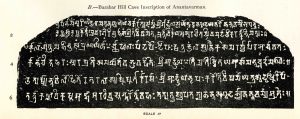
Ôm! There was a glorious king, the illustrious Yajñavarman,-who, as if he were Anu, instructed all rulers of the earth in the duty of those who belong to the warrior caste;-whose gait was like the play of a rutting elephant;-(and) through whose sacrifices (the goddess) Paulômî, always emaciated by separation from (the god Indra) who has a thousand eyes, invoked (by this king so constantly as to be perpetually absent from her), has had the beauty of (her) cheeks for a long time sullied by the falling of tears.
(Line 3.)-He, the son of the illustrious king Śârdulâ, who has the name of Anantavarman; who is reputed in the world to be benevolent to others, (and) to be possessed of fortune and manliness, (and) to be full of virtues that are as spotless as the rays of the moon,-by him was caused to be made this wondrous image, placed in (this) cave, of (the god) Bhûtapati and (the goddess) Dêvi, which is possessed of excellencies (of workmanship) some of them (previously) beheld (in other images) but others not so; (and) which confers boons upon the maker (of it). May it protect the world!
(L. 5.)-Having the surface of the full-moon that is (his) face made grey through being scattered over with spots that are (his) frowns displayed at the ends of the bent arc, glistening with (its) string pulled tight and fitted with an arrow, of the bow drawn up to the extremities of (his) shoulders, Anantavarman, whose body is like (that of) (the god) Smara,-having stood, gazed upon for a very long time by the does, indifferent to life, whose moist and tender eyes omit to blink (through the intentness with which they regard him),-(lives only) for (the purpose of dealing out) death. The far-reaching (and) powerful arrow, scattering the elephants and drifting horses wild with fear, of him who has the name of Ananta,-impelled with speed (and) skilfully discharged from the machine of (his) bow, fitted with a well-stretched string, that is drawn very tight (and) rivals the screams of an osprey (with the noise of its twanging),-teaches to the wives of (his) enemies the condition of the sorrows (of widowhood).